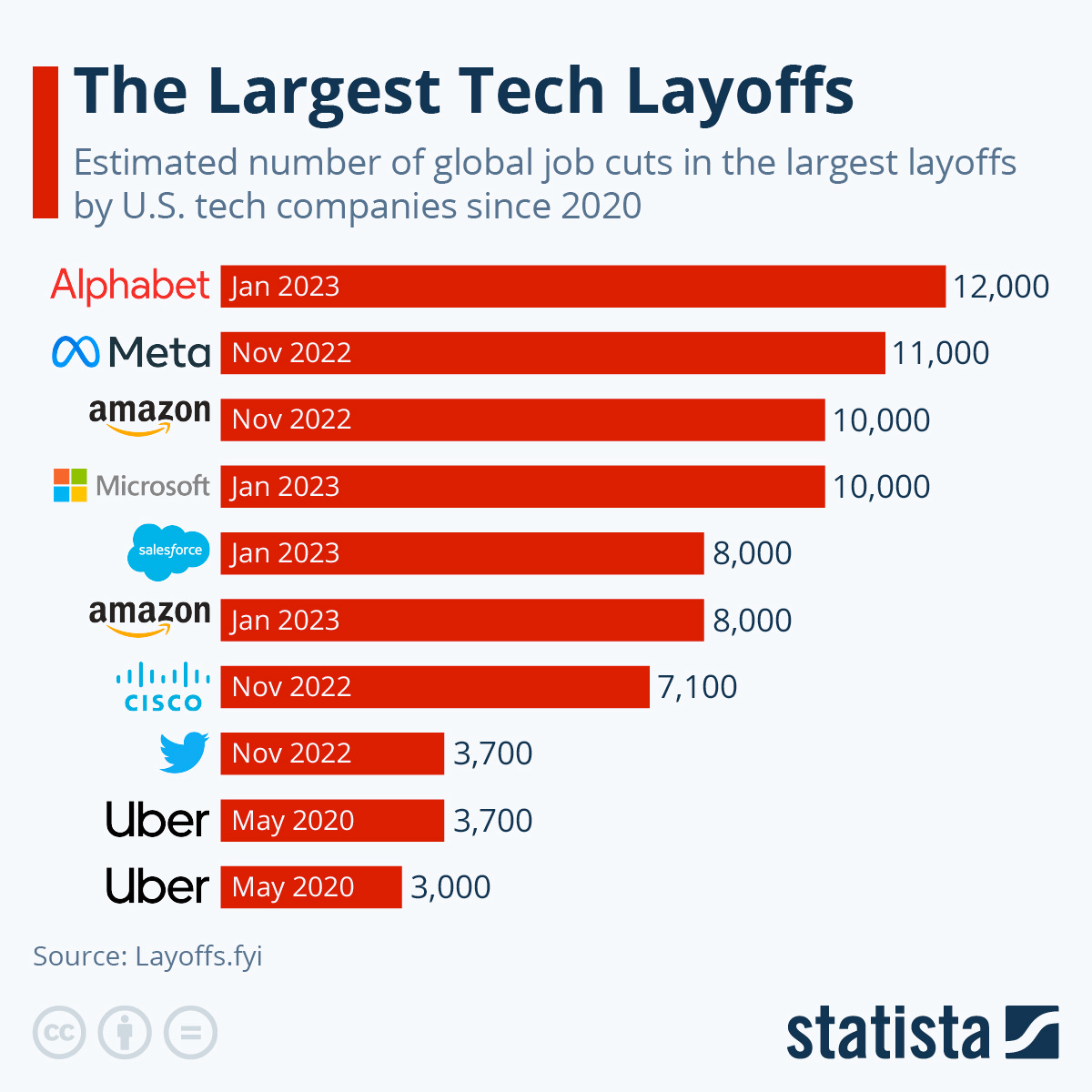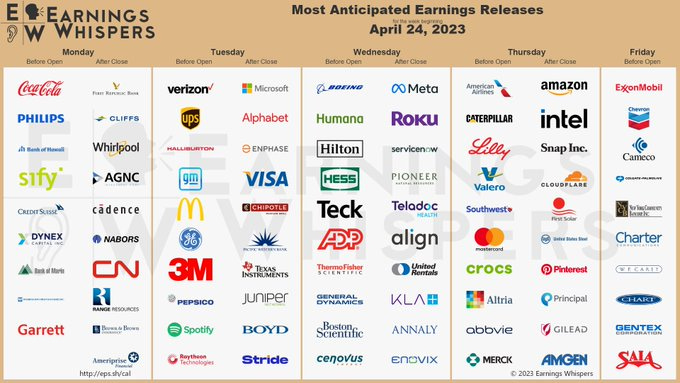Microsoft, Amazon, Alphabet, Meta lead earnings rush
The first quarter earnings season has gotten off to a better-than-feared start. This coming week, some of the biggest names in the tech industry will put investor sentiment to the test.
Markets
Dow Jones: 33,808.96 (+0.066%) 📈
S&P 500: 4,133.52 (+0.090%) 📈
Nasdaq: 12,072.46 (+0.11%) 📈
Russell: 1,791.51 (0.10%) 📈
VIX: 16.77 (-2.33%) 📉
*Stock numbers as of market close on April 21st
The week ahead will provide investors with more data on how some of the biggest players in corporate America started the year, with tech giants including Amazon AMZN 0.00%↑, Microsoft MSFT 0.00%↑, Alphabet GOOGL 0.00%↑, and Meta Platforms META 0.00%↑ all set to report quarterly results.
Investors will also closely watch Thursday's release of the first estimate of first-quarter GDP, which is expected to show the US economy grew at an annualized rate of 2% in the year's first three months.
The major averages closed last week's trading slightly lower, with earnings reactions proving mixed during the week. None of the major indexes logged a weekly move larger than the Nasdaq's 0.42% decline.
Investors expect this earnings season to bring a second straight quarter of decline in profits earned by US corporates.
Data from FactSet published Friday showed that through April 21, earnings for the S&P 500 are expected to decline 6.2% in the first quarter when combining results already reported with those expected by analysts. A week ago, expectations were for S&P 500 earnings to drop 6.7% during the quarter.
Should earnings decline 6.2% during the quarter, this would mark the largest earnings decline since the 31.6% drop in earnings reported in the second quarter of 2020.
Through last week, companies are reporting earnings that are 5.8% above estimates, below the 5-year average of an 8.4% beat, and below the 10-year average of 6.4%.
"We're getting a lot of mixed indications form the various companies reporting, even ones within the same industry," Thomas Martin, portfolio manager at GLOBALT Investments.
"I'm afraid we'll have to wait for another quarter or two before we really get definitive information one way or the other."
Results from Amazon, Microsoft, Alphabet, and Meta will highlight the coming week, with investors looking for updates on these companies' artificial intelligence efforts as well as ongoing cost cuts.

"Expectations are low," Tom Forte, an analyst at D.A. Davidson.
Forte highlighted consistent layoffs across the sector during the quarter as a sign things are only weakening in the tech sector.
"If they are laying off people, especially late in the quarter, that suggests that the macroeconomic challenges are getting more difficult," Forte said. "I think when you couple in the mini financial crisis in banking and Roku and Pinterest layoffs, that suggests that digital advertising may have taken a step backwards in the march quarter."
A report from Bloomberg last week said managers at Meta have been told to prepare for additional layoffs across its Facebook, WhatsApp, and Instagram units.
On the economic data side, many economists believe the first quarter will be the year's high watermark for economic growth.
Thursday's GDP report comes amid conflicting data on whether the economy is growing or contracting. And though Thursday's report will likely show the economy grew in the year's first quarter, nearly all of that growth came in January, according to Oxford Economics.
"The mixed survey evidence for April released so far points to a further slowdown at the start of Q2," Oxford Economics lead US economist Michael Pearce. "Meanwhile, early signs are that tighter bank lending standards are beginning to bite, but the full hit to activity won't be evident until later this year."
Investors were initially disappointed with results from Goldman Sachs GS 0.00%↑ and Netflix NFLX 0.00%↑, as shares of both names traded off before recovering to the end week.
Reports from a number of regional banks out last week showed that while some of the market's deepest fears for the sector have not yet been realized, billions of dollars of deposits have left these institutions, and the cost of keeping deposits has skyrocketed.
Investors weren't as lenient with Tesla TSLA 0.00%↑, however, as shares of the electric vehicle maker fell more than 10.5% on the week as analysts fear the automaker may need to keep lowering prices to spur demand.
"They're backed into a corner," Ronald Jewsikow, an analyst at Guggenheim. "They put a lot of supply in place that needs to find a home. And the only tool they really have is cutting prices."
Events Calendar
Monday: Chicago Fed National Activity Index, March (-0.19 previously); Dallas Fed Manufacturing Survey, March (-12 expected, -15.7 previously)
Tuesday: FHFA Housing Pricing Index, February (-0.2% expected, -0.2% previously); S&P Case-Shiller home prices, month-over-month, February (-0.35% expected, -0.3% previously); S&P CoreLogic Case-Shiller home prices, year-over-year, February (-0.10% expected, +2.55% during the prior month); S&P CoreLogic Case-Shiller U.S. National Home Price Index (3.79% during the prior month); Conference Board Consumer Confidence, April (104.1 expected, 104.2 previously); Richmond Fed Manufacturing Index, April (-8 expected, -5 previously); New Home Sales, month-over-month, March (-1.6% expected, 1.1% previously)
Wednesday: MBA Mortgage Applications, the week ended April. 21 (-8.8% previously); Advance Goods Trade Balance, March (-$90.0 billion expected, -$91.6 previously); Wholesale Inventories, month-over-month, March (+0.2% expected, +0.1% previously)
Thursday: First quarter GDP, first estimate (+2% expected, +2.6% previously); Durable goods orders, March (+0.9% expected, -1% previously); Personal consumption, first quarter (+4% expected, +1% previously); First quarter Core PCE, quarter-over-quarter, (+4.7% expected, +4.4% prior); Initial jobless claims (250,000 expected, 245,000 during the prior week); Pending Home Sales, month-over-month, March (+1% expected, +0.8% previously)
Friday: Employment Cost Index, first quarter (+1.1% expected, +1% previously); Personal income, month-over-month, March (+0.2% expected, +0.3% previously); Personal spending, month-over-month, March (-0.1% expected, +0.2% previously); PCE Deflator, month-over-month, March (+0.1% expected, +0.3% previously); University of Michigan consumer sentiment, April (63.5 expected, 63.5 previously)







Always appreciate your informative newsletter on economics and tech!